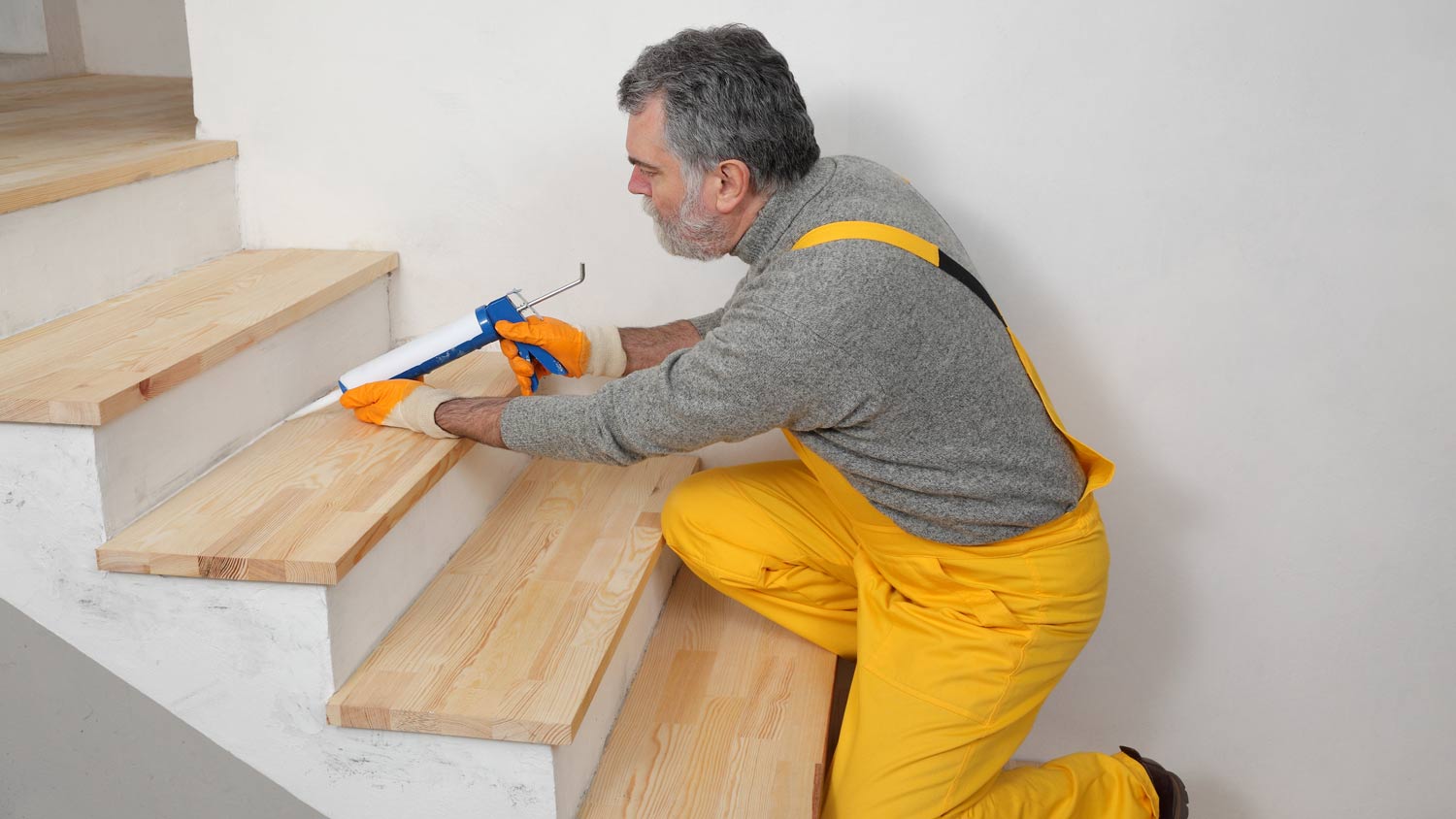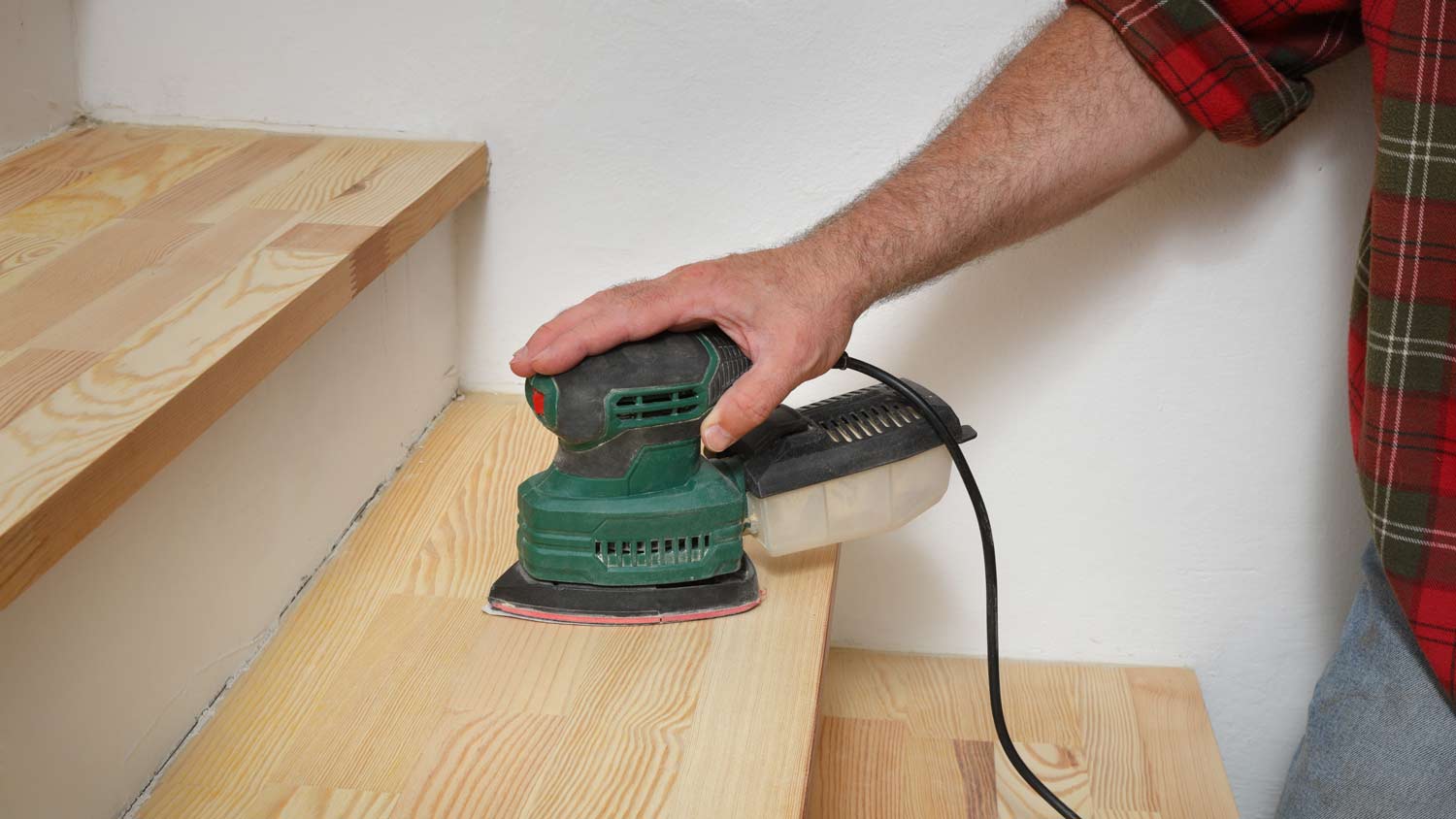
The cost to paint the interior of a house in Phoenix, AZ depends on size, layout, type of surface, and more. Learn what factors can influence your total in this guide.
The cost to refinish stairs ranges from $324 to $1,260, with an average of $792. You’ll pay more if you have many stairs or intricate banister designs.


Refinishing a wooden staircase with 12 to 17 steps costs between $700 and $1,650.
If your stairs are wider than standard, you’ll spend 15% to 20% more to refinish them.
Professional carpenters charge $50 to $200 per hour for their labor, and costs are on the higher side for ornate or custom work.
You’ll pay more for stair refinishing in an area with a higher cost of living.
The cost to refinish stairs is $792 on average, though it can range from a minimum of $117 to a maximum of $3,000 if you have several stairs and a complex staircase design. If you have an older home or high-quality wood used for your stairs, refinishing them can brighten the space and even increase the value of your home.
This article deals with refinishing wooden stairs, so engineered wood, stone, and carpet don’t apply. However, if you moved into a home and there is carpet covering your stairs, consider looking underneath—homeowners are often surprised at unique woods underneath their carpeting. Learn what all makes up the cost of a stair refinish.

Wooden stairs used to be the norm, but they’re also a great area of the house for people to show off their wealth, style, or woodworking skills. For this reason, some staircases are far more complicated than simple wooden boards placed at neat angles.
A home may have a curved staircase if it’s older and grand. A newer home may have a modern design, like a floating staircase or spiral staircase. No matter the style of staircase, assume an uptick in the required budget when dealing with any design elements that would increase the project’s timeframe—double that if those elements require specialized care (carved banisters often do).
While the staircase design has a lot to do with the total cost, size matters as well. An average one-story staircase has between 12 and 17 steps. Wider stairs will cost more in both time and materials to finish, so budget an extra 15% to 20% if your stairs are wider than normal—between 36 and 48 inches. The below values don’t account for any detailed work like banister refinishing or specialized labor or materials.
| Number of Steps | Average Refinishing Cost |
|---|---|
| 5 | $350–$800 |
| 10 | $700–$1,100 |
| 14 | $900–$1,500 |
| 19 | $1,200–$1,800 |
| 25 | $2,000–$2,600 |
| 35 | $3,100–$4,100 |

Stair builders, also called stair pros, are the best professionals to hire for stair refinishing. They have the expertise required and have skilled workers who can finish the job correctly and on time. Expect to pay between 20% and 30% of the total project cost as a percentage. You may also be quoted a flat rate for labor. Contact a local stair company to connect with a pro and get a refinishing estimate.
Professional carpenters cost $50 to $200 an hour because their specialized woodwork is done with extreme care. Carpenters understand wood better than most as they create from it as well as repair, replace, and destroy it—and they charge accordingly.
A general contractor isn’t really necessary unless you’re replacing or changing major aspects like support or railings. General contractors charge clients a percentage of the project’s total cost. Since this project isn’t expensive, it may give some contractors an incentive to inflate the price a bit. For a simple refinishing project, we recommend getting quotes from stair professionals first before talking to general contractors.
Location plays a large role in the price of refinishing stairs. Large markets with plenty of skilled labor can be inexpensive but depending on the state and city, could also be the highest in the country. The values below reflect regional pricing for a 14-step stairway.
| Location | Average Stair Refinishing Cost |
|---|---|
| New York, NY | $1,200–$1,900 |
| Honolulu, HI | $1,000–$1,500 |
| Denver, CO | $1,100–$1,350 |
| Memphis, TN | $900–$1,200 |
| Fort Wayne, IN | $750–$1,000 |
| Amarillo, TX | $700–$900 |
| Chicago, IL | $1,000–$1,450 |
| Raleigh, NC | $850–$1,150 |
Preparing the wood and getting permits are a few of the additional cost factors you should consider.
While demolition work isn’t common unless you’re completely replacing your stairs, prep work will be the single largest part of this job. Getting the wood ready for stains or other treatments takes hours and requires careful handiwork. It’s unlikely that demo and prep work will be an extra charge since it’s integral to the project—it will be in your main quote and will be the majority of the labor hours billed.
Unless you change the structure of the stairs, you shouldn’t need a permit. This should come as a relief, as permits can range from $450 to $2,800 or more. The cost of a permit is determined by the work done and the zip code where it will be completed. However, if you’re rebuilding any part of your staircase as part of the refinishing project, you should ask your municipality if a permit is necessary.
Stairs don’t often come with a warranty, however, the work performed by a professional may very well be covered. Discuss with a stair pro if that’s something that’s offered or considered. An example of needed—and therefore exercising—a warranty in this situation is having a break in the stairs caused by a chemical applied by a professional. A warranty is worth asking about but for most stair refinishing work, you won’t be offered one.
Astair or a woodworking pro can address any possible repairs needed during the refinishing project. Depending on the repair work required and whether specialized materials or tools are needed, expect to pay between $40 and $150 per hour.
Any custom work should be done by a carpenter and will inflate the cost of the project. A local company may be able to refinish that base part of the stairs but if there is any intricate work required, you’ll need to hire a pro who specializes in delicate and often irreplaceable woodwork.

Refinishing your stairs is a great DIY task to consider if you have two things: lots of elbow grease and several free hours. A professional crew can tackle this work in a day but for a single DIYer, this is most likely a week-long project.
You’ll save about 70% of the budget by doing the labor yourself. Keep in mind though that you’re going to pay more for the materials than your contractor, and your time has value as well.
Talk to a local stair company that specializes in stair work to get a quote. They may even let you work alongside them for a discount.
Unless your stairs are rotting through, pose some other type of danger, or you simply cannot stand looking at them anymore, repairing them alongside a refinish is the way to go. Replacing stairs is a big job that requires permits, multiple professionals, and thousands of dollars worth of materials.
If you notice any damage to the wood itself, you need to hire a pro to verify it’s only that section that’s affected. Many times, what occurs in one piece of wood is happening to many others.
Many times, the only materials you need to refinish stairs are sandpaper, stain, gloves, a mask, a brush, a vacuum, some old cloths, and a garbage bag. It’s hard to save money on such items, but there are still ways you can save while refinishing stairs:
Buy bulk products if possible.
Use water-based finishes, which tend to require fewer coats.
Only refinish part of the stairs at a time.
Do as much (if not the whole project) by yourself.
Refinishing stairs increases home value, but more in softer ways and less in hard numbers to the market price of the house (there are better projects to consider for this). A refinished set of stairs boosts the visual appeal of the home. This can be parlayed into gathering more quotes from buyers if you’re selling as it’s an often overlooked part of the home that positively shines when refinished.
If you sell, you may be able to recoup around 25% of the investment in the project. This is lower than other projects, so you should make sure you’re refinishing the stairs for the right reasons. Namely, this is to increase the aesthetic value of your home, not necessarily the financial value.
Home is the most important place on earth, which is why Angi has helped more than 150 million homeowners transform their houses into homes they adore. To help homeowners with their next project, Angi provides readers with the most accurate cost data and upholds strict editorial standards. We’ve surveyed thousands of real Angi customers about their project costs to develop the pricing data you see, so you can make the best decisions for you and your home. We pair this data with research from reputable sources, including the U.S. Bureau of Labor Statistics, academic journals, market studies, and interviews with industry experts—all to ensure our prices reflect real-world projects.
Want to help us improve our cost data? Send us a recent project quote to [email protected]. Quotes and personal information will not be shared publicly.
From average costs to expert advice, get all the answers you need to get your job done.

The cost to paint the interior of a house in Phoenix, AZ depends on size, layout, type of surface, and more. Learn what factors can influence your total in this guide.

The cost to paint the interior of a house in Houston, TX depends on size, layout, type of surface, and more. Learn what factors can influence your total in this guide.

The price to paint your home’s baseboards depends on the square footage and whether you DIY the project. Learn more to budget for baseboard painting.

The best paint job results in a smooth finish. But what happens when paint bubbles? Here's how to figure out what's going on and how to fix it.

Looking for painted fireplace ideas? Check out these eight top-notch paint colors to help you pick the perfect shade for your fireplace renovation.

From stone, tile, wallpaper, or paint, discover different accent wall ideas for your space.